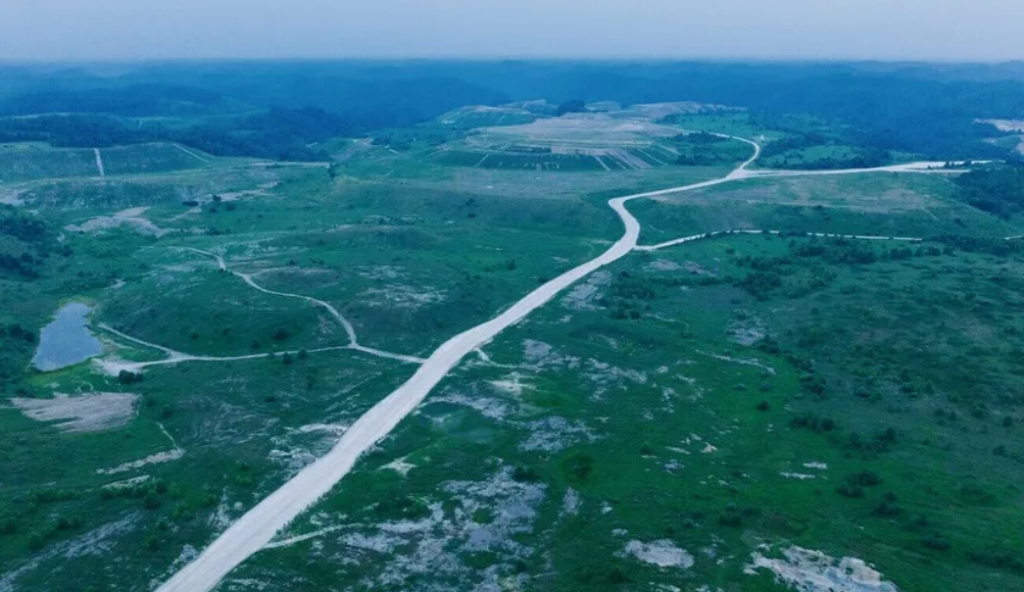January 3, 2023

At the end of 2023 more than 16 months have passed since the passage of the Inflation Reduction Act (IRA) on August 16, 2022. We are beginning to see the impact of this legislation on the ground, including in coal country Appalachia. As we do, we take the first steps from imagining a north central Appalachia revitalized by federal climate infrastructure investments to seeing “ReImagined Appalachia” come to life. This blog highlights some early examples of job-creating projects – in battery production, solar manufacturing, and solar energy. A companion blog summarizes the findings from the first databases on the geography of investment spurred by federal legislation. These show that coal county is receiving a big share of this investment – as it should be.
Here are some examples of job-creating projects in the ReImagine Appalachia region:
Nextracker LLC, a solar tracking company, is joining forces with BCI Steel to create solar trackers, which are “the metal assemblies that allow utility-scale solar array to constantly shift to face the sun as it moves through the sky.” These trackers allow solar panels to produce 20-30% more energy as they follow the movement of the sun. The site of the new facility is a vacant Bethlehem Steel factory in Leetsdale in Allegheny County, Pennsylvania, close to Pittsburgh. Nextracker and BCI Steel will renovate the factory to produce solar tracking products for a four-state region, including Pennsylvania and Ohio. This new site will create 60 full-time manufacturing jobs, like mill worker and tube mill operator.

Form Energy will build a battery manufacturing plant in West Virginia. Form Energy, Inc. will build an iron-air battery manufacturing facility in the city of Weirton, a city that used to be a national leader in steel production. The iron-air battery this facility can store electricity from wind, solar, and hydro-plants for 100 hours, which will allow the electric system to reliably run on 100% low-cost renewable energy. The company chose Weirton, in part, because of the city’s history of manufacturing and making products out of iron. The factory is under construction and projected to open in the Spring of 2024. The facility is expected to employ more than 750 people once it is fully operational.
Boston Metal will build an innovative manufacturing plant in Weirton, West Virginia. Form Energy is not the only project moving into Weirton. Just announced by the Department of Energy, Boston Metal has received funding from the Bipartisan Infrastructure Law to locate an advanced manufacturing site in this old coal town. This new site will manufacture ultrapure chromium metal and high-temperature alloys needed for a variety of advanced energy technologies. This new manufacturing facility is expected to create 200 new, good-paying manufacturing jobs.
Also in West Virginia, the Sparkz battery company is building a 350-person battery factory on the site of shuttered glass factory just off Route 50 in Taylor County West Virginia. The plant will produce batteries for off-road vehicles and commercial vehicles used in mining, farming, and delivery. Former coal miners will be trained to take jobs at the factory thanks to a May 20233 memorandum of agreement (MOA) between the United Mine Workers of America (UMWA) and Sparkz. In mid-2023, Sparkz also signed an agreement with the United Auto Workers pledging that the company will not interfere with UAW efforts to organize its battery factories across the country. The company will continue to work with the UMWA at the West Virginia plant. Sparkz batteries will be free of cobalt, used in conventional lithium-ion batteries, reducing the company’s dependence on global supply chains and lowering production costs. Sanjiv Malhorta, Sparkz’s CEO notes that former coal miners “…are highly trained when it comes to safety…Safety is paramount in the mining sector, and safety is very important as we are looking at manufacturing batteries.”
The BrightNight Starfire Renewable Power project: The developer BrightNight is using federal IRA funds to cover a 7,000 acre surface mining area with solar panels in eastern Kentucky. Mined starting in the 1960s, most of the land has been remediated through soil compaction and grass seeding. This project will transform one of the region’s largest coal mines, Starfire mine, into a clean renewable power project. In fact, this project will be the largest solar plant in the state and the largest renewable energy plant located on an old coal mine. The project is expected to create up to 300 construction jobs. The location of this solar power project in an old mining region makes sense as many local residents have a history of working in the energy sector. This project is also especially needed in this region where there is high unemployment and low life expectancy rates. BrightNight will provide renewable energy technical training and certifications to prepare workers for the energy transition. As of this writing, we don’t know what labor standards will apply to the BrightNight project and whether it will be built union. This matters to whether the federal support for the project will deliver on the promise of “good union jobs.” Across the country and the region, solar and wind projects pay wages comparable to the fossil fuel industry when built union but tend to pay low wages if not (see the boxes on p. 3 and p. 20 of this report).

Rising Appalachia’s apprenticeship will train workers while cultivating sustainable, forest-based local businesses. Thanks to funding from the Inflation Reduction Act (IRA), the small nonprofit Rising Appalachia, located in coal-impacted Dover Township, Ohio, will expand its apprenticeship program. The apprenticeship is a six-month program that aims to develop businesses focused on forest management consultation, edible landscaping, mushroom cultivation, natural building, and in other forest-related areas. The apprenticeship will educate participants through hands-on classes, on-the-job training, mentorship, and courses on topics ranging from agroforestry design and installation, ecology, sustainable forest tending, sustainable agriculture, business, and entrepreneurship.
